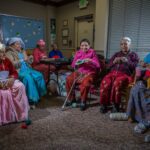As refugee resettlement to a new country can involve uncertainty and stress, recently resettled refugees in the U.S. may benefit from psychosocial support groups. This pilot project assesses two group intervention approaches provided by resettlement agencies in three U.S. states. The purpose of the project was to assess participant feedback on group benefits and limitations, to evaluate the feasibility of group implementation across resettlement agency sites, and to assess group effects on participant psychosocial outcomes (emotional distress, quality of life, social support, self-efficacy, and resilience). Ninety-seven refugees from multiple countries of origin participated in one of twelve psychosocial support groups. Eight groups received a community adjustment support group curricula and four groups received culturally adapted cognitive behavioral therapy. Within focus groups, participants described the value of group participation in building understanding, skills, and social connections. Group facilitators reported satisfactory adherence levels. Analyses of Cohen’s d effect size, bivariate, and multivariate findings indicate improvements on some outcomes subsequent to group participation, as well as some differences in outcomes by group modality. Such programs may provide a beneficial component of U.S. resettlement services. Additional research and support for psychosocial group interventions among refugee communities is needed.
Unaccompanied Refugee Minors: A Systematic Review of Psychological Interventions / Unbegleitete minderjährige Flüchtlinge: Eine systematische Übersicht über psychologische Interventionen. Kindheit und Entwicklung
In 2014, 34,300 applications for asylum were placed by unaccompanied refugee minors in 82 countries. Unaccompanied refugee minors are at a very high risk for psychological disorders, since the absence of a parent is associated with developmental risks that are further increased owing to experiences made while on flight. Given the current refugee situation in…

